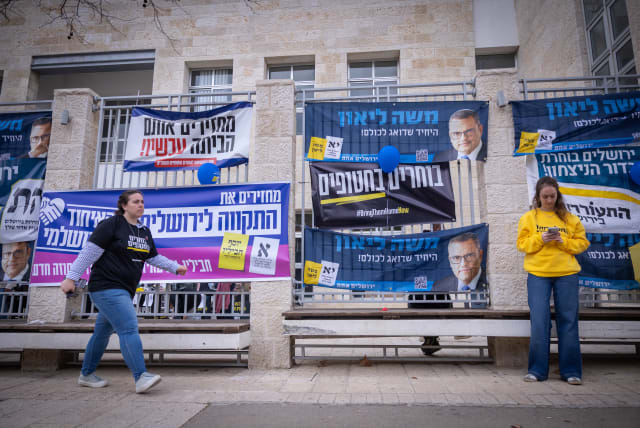Reflecting on the municipal elections through a Talmudic lens - opinion

In the aftermath of the elections, as elected officials assume their roles and communities come together to chart their future, let us commit to upholding the values of dignity, respect, and honesty.
In the aftermath of the recent municipal elections in Israel, while the dust settles and the victors celebrate, it’s crucial to reflect on the collateral damage left in the wake of the campaigns. In many cities, the battleground was not just in policy debates but in the ruthless realm of personal attacks and character assassinations.
As the adage goes, “Sticks and stones may break my bones, but words can never hurt me.” Yet, the reality is starkly different – words wield immense power, capable of inflicting deep wounds that may never fully heal.
The Talmud, in Arachin 15b, delves into the concept of lashon hara, or evil speech, highlighting its profound impact on individuals and society at large. It elucidates how lashon hara “kills” not just one, but three people: the subject of the speech, the speaker, and the listener. The damage is multifaceted, affecting reputations, moral integrity, and communal harmony.
Firstly, consider the victim – the one targeted by malicious words. Their reputation, painstakingly built over years, can be swiftly tarnished by a single smear campaign. Such attacks not only undermine the individual’s credibility but also erode public trust, making governance more challenging.
Equally significant is the perpetrator, the one who utters Lashon Hara. By engaging in this destructive behavior, they not only harm their target but also compromise their own spiritual well-being. The act of spreading falsehoods or maligning others diminishes one’s moral standing and distances them from the values of honesty and integrity.
Furthermore, the bystander, the listener, is not absolved of responsibility. Their willingness to lend an ear to slander perpetuates the cycle of harm. By providing a platform for negativity, they enable the spread of damaging rhetoric and contribute to the erosion of communal cohesion.
The Torah, in Exodus 23:7, admonishes against falsehood, emphasizing the importance of upholding truth and integrity in all dealings. This injunction serves as a guiding principle, urging individuals to refrain from engaging in or condoning harmful speech.
At a time when external pressures mount, and the world’s eyes are upon us, the need for internal unity and solidarity is more pronounced than ever. Amidst external challenges, internal strife only weakens us further. Hence, it is incumbent upon every member of society, particularly in the political arena, to exercise restraint and mindfulness in their words and actions.
Positive speech breeds positive thoughts and fosters a sense of calm and unity within communities. Rather than resorting to mudslinging and character assassination, let us strive to engage in constructive dialogue and debate. Let us focus on policies and principles rather than personal attacks, thereby enriching our democracy and strengthening the social fabric.
The power of positive words
While the dangers of negative speech are evident, it is equally important to recognize the transformative potential of positive words. Throughout history, great leaders and prophets have harnessed the power of language to inspire, uplift, and unite.
The Psalms are replete with examples of poetic verses that offer solace, hope, and praise. Psalm 23, with its comforting imagery of the Lord as a shepherd, has brought reassurance to countless souls in times of trial.
Similarly, the prophets of old, such as Isaiah and Jeremiah, delivered stirring messages of repentance, redemption, and renewal. Their words, infused with divine wisdom, challenged and comforted the people of Israel, guiding them through periods of adversity and triumph.
In more recent times, figures like Martin Luther King Jr. and Winston Churchill have left an indelible mark on history with their impassioned speeches. King’s iconic “I Have a Dream” speech, delivered during the March on Washington in 1963, continues to resonate as a powerful call for racial equality and justice.
Churchill’s wartime speeches, including his famous “We Shall Fight on the Beaches” address, rallied the British people during their darkest hours, instilling courage and resolve in the face of Nazi aggression.
These examples demonstrate the profound impact of positive words in shaping hearts and minds, galvanizing communities, and transcending adversity. In times of uncertainty and division, they serve as beacons of hope, reminding us of our shared humanity and the power of unity.
As we navigate the complexities of modern politics and society, let us draw inspiration from these timeless examples of moral clarity and leadership. Let us strive to emulate their courage, compassion, and conviction in our own words and deeds, forging a path toward a brighter, more inclusive future.
So, while the allure of negativity may be strong, let us remember the enduring truth that words have the power to heal as well as to harm. By embracing the principles of honesty, integrity, and positivity, we can build a society where words uplift rather than undermine, and where unity triumphs over division.
In the aftermath of the elections, as elected officials assume their roles and communities come together to chart their future, let us heed the lessons of the past campaign season. Let us commit to upholding the values of dignity, respect, and honesty in all our interactions. For in doing so, we not only honor our traditions but also lay the foundation for a more just, compassionate, and harmonious society. After all, it’s not just sticks and stones that leave scars – it’s the words we choose to wield.
The writer is a rabbi and physician living in Ramat Poleg, Netanya, and is a cofounder of Techelet-Inspiring Judaism.
Jerusalem Post Store
`; document.getElementById("linkPremium").innerHTML = cont; var divWithLink = document.getElementById("premium-link"); if (divWithLink !== null && divWithLink !== 'undefined') { divWithLink.style.border = "solid 1px #cb0f3e"; divWithLink.style.textAlign = "center"; divWithLink.style.marginBottom = "15px"; divWithLink.style.marginTop = "15px"; divWithLink.style.width = "100%"; divWithLink.style.backgroundColor = "#122952"; divWithLink.style.color = "#ffffff"; divWithLink.style.lineHeight = "1.5"; } } (function (v, i) { });

